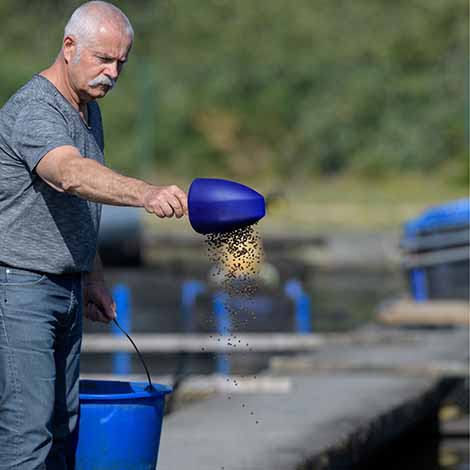Just like people, your fish need to eat to live and grow. While fish can't just drive on over to a fast food restaurant or raid the refrigerator to snack, they can utilize their highly developed senses to easily catch a quick meal. There are always exceptions to the rule but in a natural environment your fish typically have no trouble finding their own food and the game fish in your pond are not very picky about what they eat. With a diet ranging from tiny insects and plant matter to birds and small mammals there is plenty of meal choices for your fish to choose from.
Using Their Senses
Fish rely on their abilities to see, hear, smell, taste and feel to both catch prey and avoid becoming a meal for bigger predators. Food or lure that is alive and moving will be easier for your fish to detect as it has a scent, sound and vibration. The height of each individual sense depends directly on the type of fish.
- Sight: Bass have sharp eyesight to easily ambush prey concealed in submerged weed beds. Catfish are very sensitive to light due to their bottom dwelling nature, so they can see clearly in deeper darker water and tend to be active more at night or darker periods of the day.
- Smell: Bluegill develop a keen sense of smell to verify valid food options and Salmon can detect the smell of their home stream 5,000 miles out at sea and will follow the scent back to spawn.
- Hear and Feel: Fish also utilize internal sets of ears to hear. While the mechanics of how sound travels underwater is a bit different than how we hear sounds on land, fish can sense particle movements and feel vibrations in the water that can reveal both potential food or possible danger. Your fish can even differentiate or isolate specific sounds to help make sense of what they are hearing when dealing with ambient sounds created by moving water. Their ears, much like our own also provide them with a sense of balance helping them control their pitch and direction.
The same principles can be implemented when fishing your pond. If the water is turbid or it is an overcast day using bright colored lures or lures that rattle can attract fish that might otherwise dismiss your hook. Bait manufactures that have also taken into account the fact that your game fish can smell and taste are producing artificial baits that are scented to attract fish and taste appealing so the fish hangs on to the lure longer instead of spitting it out.
Food Shortage
Over population stemming from an unbalanced predator to prey ratio can have an adverse effect on fish size and their wellness. An overpopulation of prey fish in your pond may lead to fish nibbling at your fingers and toes while swimming. They are simply trying to find a snack wherever possible and that includes your precious phalanges. An overpopulation of predator fish may result in fewer and smaller malnourished fish. Restoring a balanced food chain with the appropriate number of predator and prey fish will help to remedy the issue. Ideally, there should be a 3-to-1 ratio of prey(bluegill, perch) to predator(bass) fish. To keep the prey and predator fish population in your pond thriving, make sure they have safe places to spend their time, like in the Porcupine Fish Attractor Spheres. The spheres, with their PVC-pipe barbs, provide a safe spawning habitat and a refuge for young fish. For additional details check out our article about fish stocking.
While food sources are usually abundant, many pond owners will supplement with Fish Food. This is a great source of protein, perfect for those who are looking to grow their fish rapidly for sport or are just simply looking to enjoy quality time with their fish.
